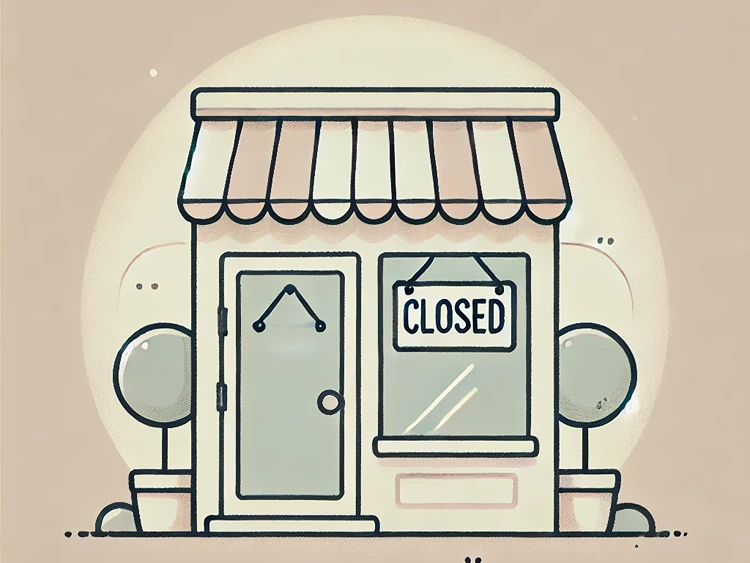Closing a small business is never an easy decision, but sometimes it’s the best move for your financial future or personal well-being. Whether it’s due to market challenges, personal reasons, or a change in focus, successfully closing your business requires careful planning and attention to legal and financial details. In this guide, we’ll walk through the steps you need to take to close your small business properly. By following each step, you’ll avoid potential legal and financial pitfalls while ensuring a smooth and well-organized process.
Why Is It Important to Close Your Small Business Properly?
If you’re thinking about shutting down your small business, you might wonder why it’s essential to follow a formal process. Can’t you just stop operating and move on? Not quite. Properly closing a small business involves more than simply locking the doors and walking away. You need to resolve outstanding financial matters, file appropriate paperwork, and officially inform relevant parties.
Consequences of Not Closing Properly
- Unpaid taxes or fees could accumulate.
- Creditors could come after your personal assets.
- You may face legal penalties for failing to file necessary documents.
- Damaged credit could affect your future business ventures.
Taking the time to close your small business properly will help you avoid these risks and allow you to transition smoothly to your next chapter.
Step 1: Assess Your Financial Situation
Before you take any action, it’s essential to have a clear understanding of your financial situation. This step involves gathering all of your financial statements, outstanding invoices, and debts.
How to Review Your Business Finances

Start by reviewing your latest financial statements, including profit and loss reports, balance sheets, and cash flow statements. This will give you a clear picture of your business’s financial health and help you make decisions about how to pay off debts or distribute any remaining assets.
Helpful Hint:
If you’re struggling to assess your finances, consider working with an accountant. They can help you understand your obligations and ensure that you don’t miss any critical steps.
Step 2: Notify Stakeholders
Once you’ve assessed your financial situation, it’s time to notify everyone involved in your business. This includes employees, suppliers, customers, and creditors.
How to Communicate with Your Employees

If you have employees, they need to be among the first to know about your decision. Be transparent about the situation, and let them know what to expect in terms of final paychecks, benefits, and any remaining work obligations. Be sure to follow legal requirements when it comes to giving notice and paying final wages.
How to Inform Customers and Suppliers
It’s also essential to notify your customers and suppliers. Give them as much notice as possible, and provide details on how you’ll handle outstanding orders, returns, or other obligations. Maintaining clear communication can help preserve your reputation even as you close your doors.
Step 3: Settle Your Debts
One of the most critical steps in closing your small business is paying off your outstanding debts. You’ll need to create a plan for settling any unpaid invoices, loans, or credit obligations.
How to Handle Outstanding Debts
Reach out to creditors to negotiate payment terms if needed. If you’re unable to pay off all your debts immediately, you might be able to arrange a payment plan. Be sure to document all conversations and agreements with creditors to avoid misunderstandings down the line.
Helpful Hint:
Make paying taxes a priority when settling your debts. Unpaid taxes can lead to significant penalties and legal issues later on, so it’s wise to ensure those obligations are handled first.
Step 4: Cancel Licenses, Permits, and Business Name
Depending on your industry and location, your small business likely required specific licenses and permits to operate legally. When closing, you’ll need to cancel these licenses and permits with the appropriate government agencies. Additionally, if you registered your business name, you must file the necessary paperwork to cancel it.
How to Cancel Your Business Registration
Check with your local and state authorities to understand what forms or applications you need to complete to cancel your business registration. This step is crucial to avoid ongoing obligations such as business taxes or fees.
Step 5: File Final Taxes
Even though you’re closing your business, you’re still responsible for filing final tax returns with the IRS and your state’s tax agency. These final returns will include your income tax, employment tax, and any sales tax that applies.
Steps for Filing Final Taxes
Ensure you submit all the necessary forms, including those for any employees or contractors you had. If you’re unsure about your tax obligations, it’s a good idea to consult with an accountant or tax advisor to make sure everything is filed correctly.
Stats:
According to the IRS, 20% of small businesses fail to file proper closing documents, leading to ongoing tax liabilities and penalties.
Step 6: Dissolve Partnerships or Corporations
If your small business is a partnership, LLC, or corporation, you must legally dissolve the entity to avoid future liabilities. This process involves formal legal steps that vary depending on your business structure and location.
How to Dissolve a Partnership
If your business is a partnership, review your partnership agreement for any dissolution procedures. Typically, you’ll need to provide written notice to your partners, settle any debts, distribute remaining assets, and file dissolution forms with the state.
Steps for Dissolving an LLC or Corporation
For an LLC or corporation, you’ll need to follow your state’s specific procedures for dissolution. This usually involves a vote by the members or shareholders, filing articles of dissolution with the state, and settling any remaining financial obligations. Be sure to cancel any business licenses or permits in the entity’s name as well.
Helpful Hint:
Consult with a business attorney to ensure you follow all legal requirements for dissolution. This can help prevent any future legal issues that might arise from an incomplete or improperly handled closure.
Step 7: Handle Business Assets
After you’ve settled your debts, you’ll need to address your remaining business assets. These could include inventory, equipment, real estate, or intellectual property. Handling these assets effectively can help you recoup some of your investments.
How to Liquidate Business Assets
Liquidation is the process of selling your business assets to pay off debts or distribute to owners. Depending on your assets, you might consider holding an auction, selling to competitors, or listing items online. Be sure to document all sales and transactions for your records.
Dealing with Intellectual Property
If your business holds trademarks, patents, or copyrights, you’ll need to decide what to do with these assets. You might choose to sell them, transfer ownership, or simply let them expire if they no longer hold value.
Stats:
According to a survey by the Exit Planning Institute, 70% of business owners do not adequately plan for the sale or transfer of their intellectual property when closing their business.
Step 8: Resolve Final Legal Obligations
Closing a small business also involves resolving any remaining legal obligations. This could include finalizing contracts, addressing any pending lawsuits, and ensuring all legal documents are properly filed.
How to Finalize Contracts
Review any ongoing contracts to determine your obligations. You may need to negotiate early termination with clients or vendors, or fulfill the terms of the contract before closing. Make sure to get all agreements in writing to avoid future disputes.
Handling Pending Lawsuits
If your business is involved in any legal disputes, you’ll need to resolve these before closing. This might involve settling out of court, going through mediation, or completing any required legal processes. It’s crucial to consult with a legal professional to protect yourself from future liability.
Step 9: Inform Creditors and Settle Outstanding Accounts
Informing your creditors and settling outstanding accounts is a critical step in closing your business. This ensures that all your financial obligations are met, and it helps protect your credit score.
How to Communicate with Creditors
Start by listing all your creditors and outstanding balances. Contact each one to inform them of your business closure and discuss repayment plans if necessary. Be transparent about your financial situation to negotiate favorable terms.
Settling Final Accounts
Pay off any remaining balances as soon as possible. If you’re unable to pay in full, consider negotiating a settlement. Document all payments and agreements to keep a clear record of your efforts to resolve outstanding debts.
Step 10: Notify Tax Authorities and Cancel Tax Accounts
Once your business is closed, you’ll need to notify the IRS and your state’s tax agency to close your tax accounts. This prevents future tax liabilities and ensures you’re in compliance with all tax laws.
How to Close Your IRS Tax Account
File your final tax returns and indicate that this is your last return by checking the appropriate box on the form. Include any required forms such as W-2s for employees or 1099s for contractors. The IRS will process your final return and close your account.
Canceling State and Local Tax Accounts
Contact your state and local tax authorities to cancel your business tax accounts. This might involve submitting a form or simply notifying them in writing. Be sure to follow any specific procedures your state requires to avoid future tax issues.
Step 11: Maintain Your Business Records
Even after closing your small business, it’s essential to maintain your business records for several years. These records can be vital if you ever need to provide documentation for taxes, legal matters, or personal reference.
Key Documents to Keep After Closing Your Business
| Document | Why It’s Important |
|---|---|
| Final Tax Returns | Necessary for IRS records and potential audits. |
| Dissolution Papers | Proof that your business was officially closed with the state. |
| Financial Statements | Helpful for personal records and future business ventures. |
| Contracts and Legal Agreements | Essential for resolving any future disputes or legal matters. |
| Employee Records | Required by law to keep for a certain number of years. |
How Long Should You Keep Business Records?
The IRS generally recommends keeping tax records for at least seven years. This includes your final tax returns, W-2s, 1099s, receipts, invoices, and any other documents that support your financial and tax filings. For other types of records, such as legal documents and contracts, it’s wise to keep them for at least 3-5 years, depending on your state’s regulations.
Organizing and Storing Records
Make sure your records are well-organized and stored in a secure location. You might choose to keep digital copies on a secure cloud service or physical copies in a safe place. Ensure that these records are easily accessible in case you need them in the future.
Helpful Hint:
Consider using a document management system to keep your records organized and secure. This can help you quickly find and access the information you need, even years after your business has closed.
Step 12: Notify Relevant Parties and Close Accounts
After you’ve taken care of legal and financial matters, the next step is to notify any remaining relevant parties and close any accounts associated with your business. This helps to finalize the closure and ensure no loose ends are left behind.
Who Should You Notify?
Notify your bank, creditors, utility companies, landlords, and any other service providers that your business is closing. Ensure that all accounts are settled and officially closed to avoid any future charges or fees.
Closing Bank Accounts and Credit Lines
Once all payments have been made, close your business bank accounts and credit lines. Be sure to withdraw any remaining funds and cancel any recurring payments or subscriptions associated with your business. Request written confirmation of the account closures for your records.
Step 13: Reflect on the Closure and Learn from the Experience
Closing your small business is a significant event, and it’s important to take the time to reflect on the experience. This reflection can provide valuable insights that will benefit you in your future endeavors, whether personal or professional.
What Did You Learn?
Consider what you’ve learned throughout your time running your business. What successes did you achieve? What challenges did you face? Reflecting on these experiences can help you grow and apply this knowledge to your next venture.
Planning Your Next Steps
As you move forward, think about your next steps. Whether you’re planning to start a new business, enter a different industry, or take some time off, having a clear plan can help you transition smoothly. Use what you’ve learned to make informed decisions about your future.
Helpful Hint:
Consider writing down your reflections in a journal or document. This can serve as a helpful reference in the future, allowing you to revisit the lessons you’ve learned and apply them to new opportunities.
Step 14: Seek Professional Support if Needed
Closing a small business can be an emotional and challenging process. If you’re feeling overwhelmed, don’t hesitate to seek professional support. This could include working with a business consultant, a financial advisor, or even a therapist to help you navigate the closure and plan for the future.
When to Consult a Business Consultant
If you’re unsure about any of the steps in closing your business, a business consultant can provide expert guidance. They can help you ensure that all legal, financial, and operational matters are properly addressed, minimizing the risk of future complications.
The Benefits of Financial and Emotional Support
Financial advisors can help you manage any remaining assets, plan for taxes, and invest your proceeds wisely. Emotional support, such as therapy or counseling, can help you cope with the stress and emotions that often accompany closing a business. Taking care of your mental health is just as important as managing your financial health during this time.
A Balanced Look at Closing Your Small Business
The “Pros and Cons” section is indeed suitable for the nature of this article, as it provides a balanced view of the potential benefits and challenges of closing a small business. This section would be best inserted after the “Reflect on the Closure and Learn from the Experience” section, offering readers a chance to weigh the advantages and disadvantages before making their final decision.
Pros
- Opportunity to minimize ongoing financial losses and cut expenses.
- Freedom to pursue new opportunities or business ideas.
- Closure allows for a fresh start, both personally and professionally.
- Potential to sell business assets and recover some investments.
- Avoidance of future legal liabilities or regulatory issues.
Cons
- Emotional difficulty in letting go of a business you’ve built.
- Potential financial loss, especially if debts or obligations remain.
- Complex and time-consuming process, including legal and financial tasks.
- Impact on employees who may lose their jobs or face uncertainty.
- Possible damage to reputation if the closure is not handled properly.
FAQs
Wrapping Up
Successfully closing your small business is a detailed and often emotional process, but following the proper steps can make it manageable. From assessing your financial situation and notifying stakeholders to handling legal obligations and reflecting on your experience, each step is critical to ensure a smooth closure. By approaching the closure thoughtfully and strategically, you can protect your financial interests, preserve your reputation, and position yourself for future opportunities. Remember, while closing your business marks the end of one chapter, it also opens the door to new possibilities. Take the time to learn from the experience and plan your next steps with confidence.
